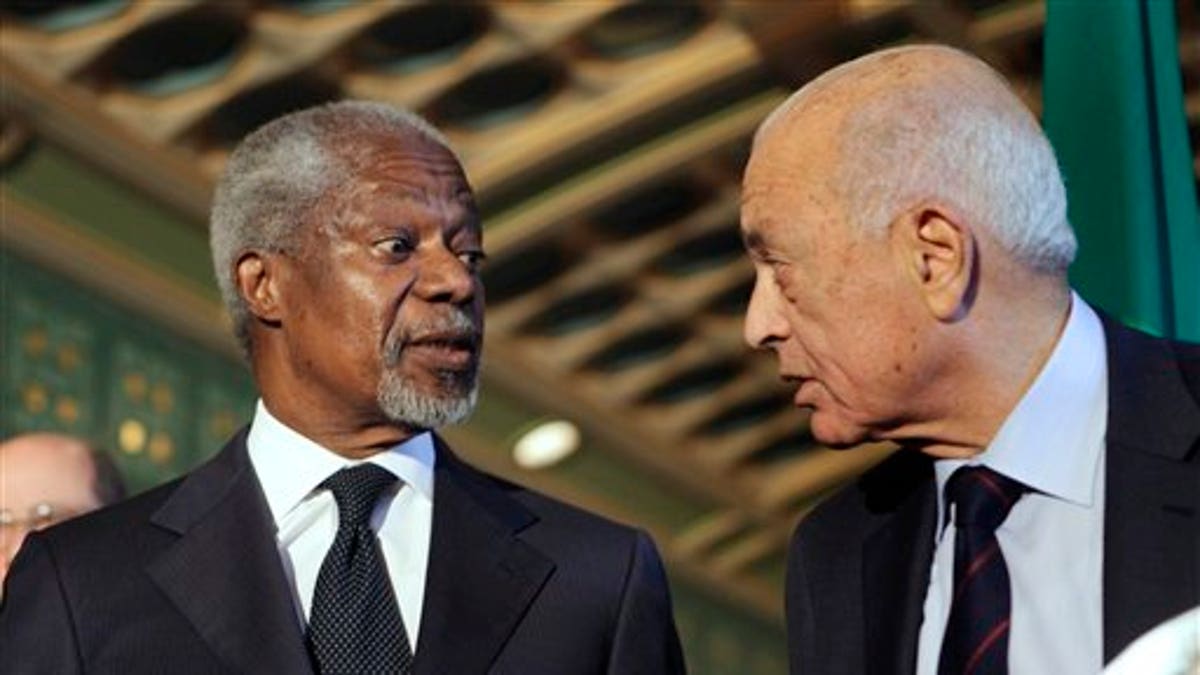
March 8: Former U.N. chief Kofi Annan, left, listens to Arab League chief Nabil Elaraby during a presser following their meeting at the Arab league headquarters in Cairo, Egypt. (AP)
BEIRUT – The leader of Syria's main opposition group rejected calls Friday by U.N. envoy Kofi Annan for dialogue with President Bashar Assad's government, saying they were pointless and unrealistic as the regime massacres its own people.
As the prospects for diplomacy faltered, Turkey's state-run television TRT said two Syrian generals and a colonel defected to Turkey on Thursday.
If confirmed, the military defections would be significant as most army defectors so far have been low-level conscripts. On Thursday, Syria's deputy oil minister announced his defection, making him the highest-ranking civilian official to join the opposition.
In a telephone interview from Paris, Burhan Ghalioun, who heads the opposition Syrian National Council, told The Associated Press that Annan already has disappointed the Syrian people.
Annan, who has been appointed joint U.N.-Arab League envoy to Syria, has said his mission was to start a "political process" to resolve the conflict in the country. He is due this weekend in Syria where he will meet with Assad.
In comments made in Cairo on Thursday after talks with Arab League chief Nabil Elaraby, Annan warned against further militarization of the Syrian conflict and urged the opposition to come together with the government to find a political solution.
"I hope that no one is thinking very seriously of using force in this situation," Annan said. "I believe any further militarization would make the situation worse."
Annan also said he would be making "realistic" proposals to resolve the conflict. He did not elaborate.
But Ghalioun blasted such statements as unrealistic.
"These kind of comments are disappointing and do not give a lot of hope for people in Syria being massacred every day," Ghalioun said. "It feels like we are watching the same movie being repeated over and over again."
"My fear is that, like other international envoys before him, the aim is to waste a month or two of pointless mediation efforts," he added.
Syrian activists also rejected Annan's call for dialogue.
"It seems he lives on Mars," said Mohammad Saeed, an activist in the Damascus suburb of Douma.
"Between us and Bashar Assad are the bodies of 5,000 martyrs. We can't hear each other even if we wanted to," he said. "What dialogue are they talking?"
Syria's opposition is fragmented and suffers from infighting, but most factions reject talks with the government while the military crackdown continues.
The U.N. says more than 7,500 people have been killed in the past year since the revolt against Assad erupted in the country's south and engulfed the country. Activists put the death toll at more than 8,000.
The uprising began with largely peaceful protests, but faced with a vicious regime crackdown, it has become increasingly militarized.
The SNC is openly calling for outside military intervention, but the subject is controversial and divisive.
"Any political solution will not succeed if it is not accompanied by military pressure on the regime," Ghalioun said.
Ghalioun faulted Annan for "avoiding" any references to the essence of the problem, which is the regime's use of extreme military force to crush the protests.
"As an international envoy, we hope he will have a mechanism for ending the violence," Ghalioun said.
Ghalioun also welcomed the defection by deputy oil minister Abdo Husameddine and called on other high-ranking government employees "and all those with a conscience" to do the same.
Turkey's state-run television said two Syrian generals and a colonel have defected to Turkey as Syrian forces appeared to be targeting more rebellious areas, including the northern province of Idlib near Turkey.
The report came as U.N. humanitarian chief Valerie Amos toured Syrian refugee camps along the Turkish-Syrian border before talks with Turkish Foreign Minister Ahmet Davutoglu later on Friday.
TRT television said the three officers were among 234 Syrians who crossed into Turkey since Thursday to find refuge in six camps where more than 11,000 have sought sanctuary.
Protests were planned across Syria on Friday, with the aim of rallying the country's Kurdish population in the hopes that members of the long-ostracized minority could help turn the tide against Assad.
Kurds -- the largest ethnic minority in Syria -- make up 15 percent of the country's 23 million people and have long complained of neglect and discrimination.
While Kurds have so far not joined anti-government protests in particularly large numbers, authorities are clearly concerned they will. In April, Assad granted citizenship to 250,000 Kurds in an early overture to try to interrupt the momentum of the uprising.
In the past, the government has argued that they are not Syrians but Kurds who fled to the country from neighboring Turkey or Iraq.
Tensions between Kurds and the Syrian authorities have exploded into violence on several occasions. In March 2004, a riot began at a soccer match when the crowd raised a Kurdish flag in the northeastern city of Qamishli. Clashes between Syrian Kurds and security forces spread to the nearby cities of Hasaka and Aleppo, with at least 25 killed and 100 wounded.
